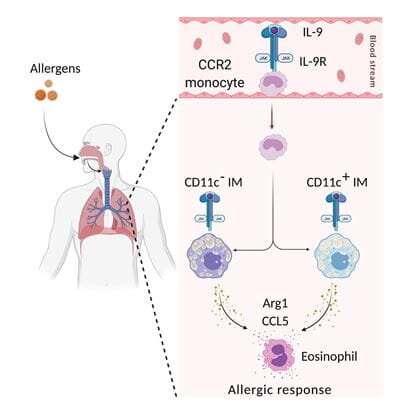Home » Health News »
Study of cytokines could lead to new treatment for people with asthma, food allergies

Researchers at Indiana University School of Medicine Department of Microbiology and Immunology have made an important new discovery about how a particular molecule could improve lung function for people with asthma and food allergies.
“Millions of children and adults in the United States have asthma, which results from allergen-induced inflammation in the lungs,” said Mark Kaplan, Ph.D., chair of the Department of Microbiology and Immunology and the senior author of the study. “The ability of cells to communicate with each other is critical in the development of inflammation and occurs through the release of molecules called cytokines.”
One of these cytokines, interleukin-9 (IL-9), has been found in patients with asthma and food allergy, but how IL-9 promotes inflammation has been unclear. In the study published recently in Science Immunology, researchers define one of the cell types, called the lung macrophage, as a major target of IL-9.
They found allergic lung inflammation decreased when the receptor for IL-9 was missing and the macrophage is critical for IL-9 function in the allergic lung. They also defined downstream effectors of IL-9 in the macrophage, identifying enzymes and additional cytokines that are required for the development of allergic inflammation, and found a correlation between IL-9 and the downstream effectors with the diagnosis of asthma in patients.
Source: Read Full Article


